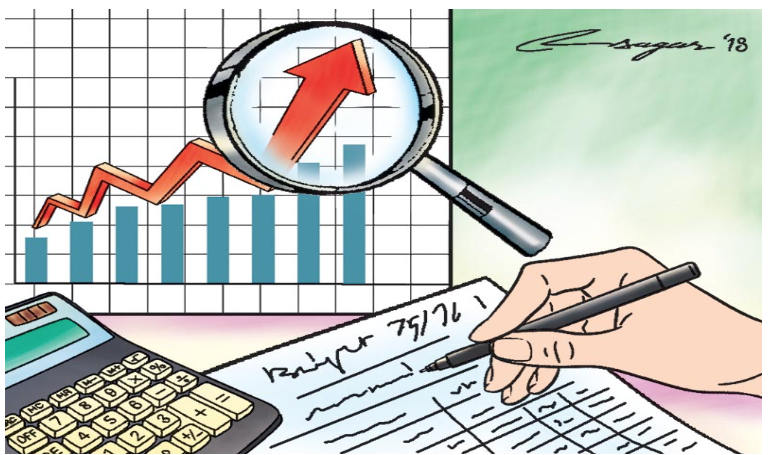CommentsLA WATCHDOG--“Any unanticipated economic stress in the future would put L.A. in a far more precarious financial situation.” Ron Galperin, March 2, 2020, Revenue Finance Report.
On Wednesday, Mayor Eric Garcetti declared a State of Emergency for the City of Los Angeles to “prevent the spread of the coronavirus and protect public health.” He should also apply this State of Emergency to the City’s budget and finances.
Prior to the State of Emergency, the City’s budget was already in a “precarious” position because of the new budget busting labor agreements with the police and fire fighters created a raging river of red ink that caused a negative swing in the City’s finances of $1.6 billion over the next 4½ years.
Despite a booming economy and record General Fund revenues $6.6 billion, the City went from a balanced budget in June to a shortfall of $200 million in October and, over the next four years, from a projected surplus of $200 million to a cumulative deficit of an estimated $1.2 billion.
The City is also burdened by at least $30 billion of long term liabilities, including an unfunded pension liability of $15 billion, a deferred maintenance budget for our streets, parks, and the rest of our deteriorating infrastructure of at least $10 billion, and billions in long term debt.
While the extent of the economic impact of the coronavirus on the City’s finances has yet to be determined, it places the City in a “far more precarious position” because it will have a negative impact on the City’s revenues.
To date, imports from China to the Port of Los Angeles are off 25%. Tourism and the Convention Center will be hard hit, lowering the transient occupancy tax. The lobby of the Bradley International Terminal, usually a mass of humanity, is deserted. Theatres are empty. The premier of the new James Bond movie, No Time to Die, has been pushed back to Thanksgiving. The City’s two pension funds will be slammed by the 10-15% decline in the stock market. And there are many other areas that are being adversely affected by the coronavirus.
And what about Opening Day at Dodger Stadium?
The City will tell us that it has reserves of $500 million. But these reserves were already below recommended levels and may prove inadequate given the need to finance the new labor agreements, this year’s $200 million shortfall, next year’s budget deficit of $200 million, the lower level of revenues caused by the coronavirus, and the additional expenditures associated with the State of Emergency.
This is no time to keep Angelenos in the dark. We are in a State of Emergency. The City Hall must address the impact of the coronavirus as well as its deceptive budget practices if it wants to regain the trust of Angelenos. This starts with the Mayor and City Council endorsing the policy of Radical Transparency*proposed by the Neighborhood Council Budget Advocates in its annual White Paper.
The Mayor and City Council may once again treat us as mushrooms, tell us to buzz off, get lost, pound sand, and we know best. But we may return the favor in November when they ask us to approve the “Split Roll” that will cost us $12 billion a year.
*******************
Radical Transparency includes:
- Update the Four-Year Budget Outlook to reflect the current budget reality, including the projected deficits.
- Require the Mayor to submit the budget to the City Council on or before February 1 rather than the current deadline of April 20. Each Department will then present its proposed budget and priorities to the appropriate City Council Committee. Afterwards, the Budget and Finance Committee will conduct hearings on each Department’s budget.
- All labor negotiations shall be open and transparent. Furthermore, the City shall solicit an independent opinion that analyzes the fiscal impact of any new labor contracts. Beginning 30 days after the release of the independent opinion and prior to approval, the City Council will conduct a series of public meetings to discuss the new labor contracts. Any new labor agreements shall not result in deficits.
- Create a Pension Commission to review and analyze the City’s pension and Other Post-retirement Employment Benefit (OPEB) plans and develop recommendations to eliminate the unfunded liability over time. [Recommended by the LA 2020 Committee]
- Implement multiyear budgeting. [Recommended by the LA 2020 Committee]
- Develop a ten-year infrastructure plan that includes, but is not limited to, streets, sidewalks, parks and their restrooms, trees, buildings, and vehicles. This will include plans for the Los Angeles River, the Civic Center, and the Convention Center.
- Benchmark the efficiency of the City’s Departments and operations.
- Implement a plan to increase the City’s Reserve and Budget Stabilization Funds to an amount equal to 10% of its General Fund Revenues.
- Establish an independent Office of Transparency and Accountability to oversee the budget and other related matters in real time. [Recommended by the LA 2020 Committee]
- Develop solutions to balance the budget over the next four years and eliminate the Structural Deficit.
(Jack Humphreville writes LA Watchdog for CityWatch. He is the President of the DWP Advocacy Committee and is the Budget and DWP representative for the Greater Wilshire Neighborhood Council. He is a Neighborhood Council Budget Advocate. He can be reached at: [email protected].)
-cw
















